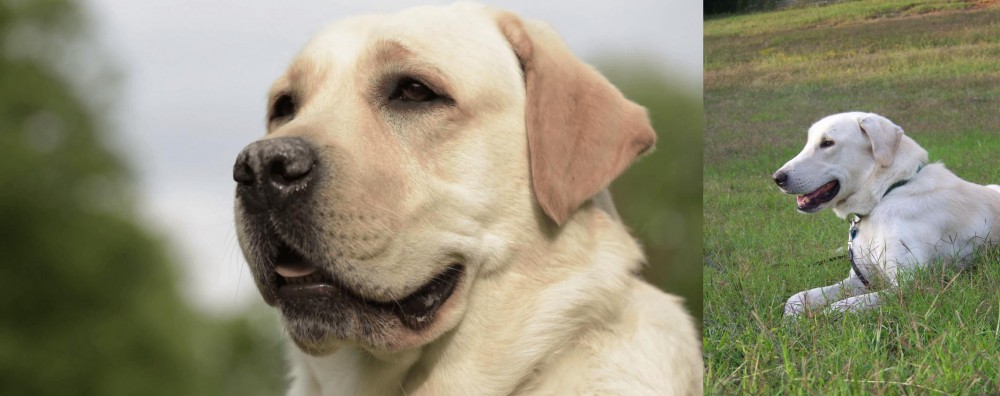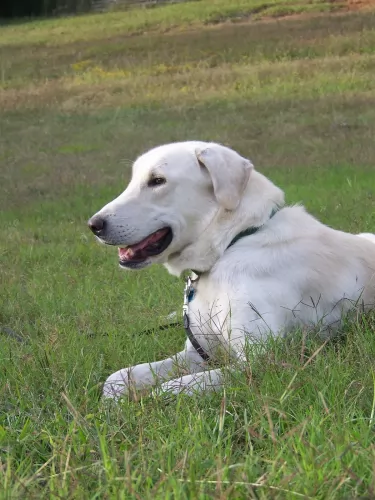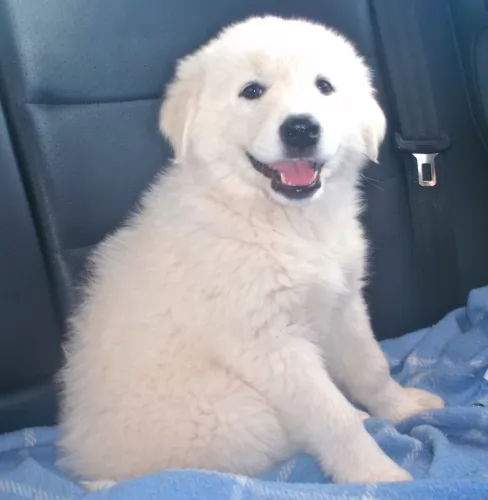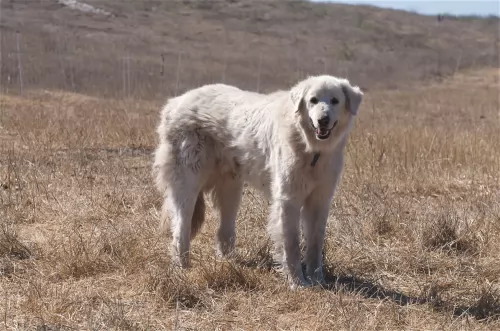 Petzlover
Petzlover Labrador Retriever is originated from Canada but Akbash Dog is originated from Turkey. Labrador Retriever may grow 22 cm / 8 inches shorter than Akbash Dog. Labrador Retriever may weigh 29 kg / 63 pounds lesser than Akbash Dog. Both Labrador Retriever and Akbash Dog has almost same life span. Both Labrador Retriever and Akbash Dog has almost same litter size. Labrador Retriever requires Low Maintenance. But Akbash Dog requires Moderate Maintenance
Labrador Retriever is originated from Canada but Akbash Dog is originated from Turkey. Labrador Retriever may grow 22 cm / 8 inches shorter than Akbash Dog. Labrador Retriever may weigh 29 kg / 63 pounds lesser than Akbash Dog. Both Labrador Retriever and Akbash Dog has almost same life span. Both Labrador Retriever and Akbash Dog has almost same litter size. Labrador Retriever requires Low Maintenance. But Akbash Dog requires Moderate Maintenance
 The Labrador Retriever has its origin from Newfoundland which is an island.Dorset Eskimos are the people who settled down first in Newfoundland. Newfoundland was discovered in 1494 by the Bristol traders from England. The people in the Newfoundland used Lab to help them during fishing.They were recognized as a kennel club breed in England.
The Labrador Retriever has its origin from Newfoundland which is an island.Dorset Eskimos are the people who settled down first in Newfoundland. Newfoundland was discovered in 1494 by the Bristol traders from England. The people in the Newfoundland used Lab to help them during fishing.They were recognized as a kennel club breed in England.
The Lab has its special talents in fishing, it nicely holds the fish in its mouth and swims well to bring it to the fisherman who was its master. They are also used to hunt game birds and waterfowl.
 Akbash breed became popular in the 1970s. Around that period, Akbash was introduced to North America. There is archeological evidence that this breed was popular even in the 750-300 BC. Of course, it wasn’t the exact dog as we know it today, but there are many similarities between Akbash and dog from the ancient period. This breed was developed in Turkey to be a guardian dog. They were perfect flock guardians.
Akbash breed became popular in the 1970s. Around that period, Akbash was introduced to North America. There is archeological evidence that this breed was popular even in the 750-300 BC. Of course, it wasn’t the exact dog as we know it today, but there are many similarities between Akbash and dog from the ancient period. This breed was developed in Turkey to be a guardian dog. They were perfect flock guardians.
 Lab is a nice companion and also it helps in doing several works if it is trained. Lab is the America's most popular breed. They help the hunters, works with police and also serves physically challenged people. They are very friendly and it helps people so much by doing many works. They have very good sensitivity and are so affectionate with family members.
Lab is a nice companion and also it helps in doing several works if it is trained. Lab is the America's most popular breed. They help the hunters, works with police and also serves physically challenged people. They are very friendly and it helps people so much by doing many works. They have very good sensitivity and are so affectionate with family members.
They have very high energy level in their young stage. The Lab is a muscular and athletic dog. They are sweet natured and well deserved. Lab needs physical and mental activities regularly as they are very intelligent and energetic. The pure bred Labs have black, chocolate and yellow colours. They are very interested in hunting and roaming. The young Lab should be given training to swim as a child, as they likes it very much. They takes more time to mature hence remaining as teenager for a long time when compared with other breeds.
 Weight of the Akbash dog variates from 41-64kg, while their height is 71-78cm. Female Akbash is smaller than a male Akbash, but not for much.
A lifespan of an average Akbash dog is 10-11 years, but if they have cared properly, they tend to live longer.
Litter Size of Akbash is 8-9 puppies.
Another Name for Akbash is Akbas Coban Kopegi, Coban Kopegi.
Weight of the Akbash dog variates from 41-64kg, while their height is 71-78cm. Female Akbash is smaller than a male Akbash, but not for much.
A lifespan of an average Akbash dog is 10-11 years, but if they have cared properly, they tend to live longer.
Litter Size of Akbash is 8-9 puppies.
Another Name for Akbash is Akbas Coban Kopegi, Coban Kopegi.
 The Lab has a very good adaptability, it will get adjusted with its environment.
The Lab has a very good adaptability, it will get adjusted with its environment.
Lab has a good learning ability and it can learn upto 300 human phrases. They are the 7th most intelligent dog breed.
They are very much interested in playing with kids and are a very good companion for them.
 Have in mind that Akbash is a large and powerful dog. They are bred through generations to be guardians and suspicious. They are very independent because they tend to make their own decisions while guarding flocks. They will require adequate socialization, but overall, they are very intelligent and they tend to learn quickly. It requires time and patience, but are great pets for right owners. Akbash has a white to biscuit color coat. They also have a dark pigment around nose, eyes, and mouth. Akbash is very quick and agile dog, which might be surprised because of its size.
Have in mind that Akbash is a large and powerful dog. They are bred through generations to be guardians and suspicious. They are very independent because they tend to make their own decisions while guarding flocks. They will require adequate socialization, but overall, they are very intelligent and they tend to learn quickly. It requires time and patience, but are great pets for right owners. Akbash has a white to biscuit color coat. They also have a dark pigment around nose, eyes, and mouth. Akbash is very quick and agile dog, which might be surprised because of its size.
It is important to train them since the puppyhood. They are working dogs and they will be happy when they have tasks during training. Due to their independence, consistent and steady training is important. An old-fashioned way of training that includes punishment is not recommendable. Positive training with awards is the best way to train your Akbash dog. They do not require a lot of daily exercises. Daily walks would do more than enough. Younger dogs need more exercise than more mature ones. They can be very good for other animals, but they have to be socialized with them. It is the best way to socialize your dog when it is still a puppy.
 The 2 month old puppy should be given 200 to 250gms of food. 3 month old puppy should be given 250 to 300gms of food and 6 months older should be given 350 to 450gms. The varieties of food which are popular is kibbles, Barf, wet food and Home cooked puppy food.
The 2 month old puppy should be given 200 to 250gms of food. 3 month old puppy should be given 250 to 300gms of food and 6 months older should be given 350 to 450gms. The varieties of food which are popular is kibbles, Barf, wet food and Home cooked puppy food.
Lab can be fed by dry kibbles and also by raw meat or bones. Now-a-days most of the Lab are being fed with kibbles. Kibbles are the dried pellets of dog food that can be bought in pet shop or even online. Raw meat and bones are very much popular food among dog owners in UK.
For good health, Lab should be fed by a diet controlled food. Because overfeeding will lead to overweight of the dog as it causes weakness of bones.
Lab is a very energetic dog, so it should be given some time to play daily. It will be very happy if it is given a fenced ground to play and burn off his natural energy. Also it will be very good for lab if it is given chance to swim weekly once.
 Akbash dog is very easy to care. They can stay fit on a minimum amount of food. 2-2.5 cups divided into two meals would be ideal for your dog. They require meat, so giving them dry industrial food can be a solid substitute. Vegetables and oil can also be included in meals. It will keep your dog healthy and happy.
Akbash dog is very easy to care. They can stay fit on a minimum amount of food. 2-2.5 cups divided into two meals would be ideal for your dog. They require meat, so giving them dry industrial food can be a solid substitute. Vegetables and oil can also be included in meals. It will keep your dog healthy and happy.
Puppies have to eat more meals per day. It is the best to give your puppy Akbash 3-5 meals per day. Those meals should be divided into smaller portions. It is recommended to give your puppy all necessary vitamins and minerals that include calcium for stronger bones. It will improve the overall health of your dog, and it will help it develop into a healthy adult dog.
Akbash will request some grooming, but they are not very difficult to groom. They require regular grooming. Every few days will be enough, except when they are shedding. Akbash will need daily grooming when shed. You can bath your pet occasionally, but not very often. Bathing, if necessary, should be done only 5-6 times a year. There is no need for more.